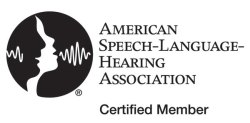If your work as a speech language pathologist involves children, you most likely spend at least 48 to 52 hours a year with each client and their family, depending on the setting where you work – school, clinic or in the home. Most families I work with have had their children in therapies for years and they know the drill and the questions to ask. But what about those families who are new to having their child in speech therapy, or parents experiencing therapy burnout? Here are five quick tips to help educate your families with children in speech therapy:
Get personal.
You spend time on building a case history for your client, but how often does a client inquire about you as a person or professional? Give them some details! Invite them into your world and hopefully they will do the same. Too often, I think parents feel they are on some sort of therapy assembly line. Help break this pattern for them!
Show your credentials.
Help educate families about your education. Some parents have drilled me on my experience and education before therapy begins. Others don’t ask a thing and blindly walk into the session because their doctor prescribed therapy. Don’t read off your college transcripts here, but help the family better understand what you are trained to do and why they and their child are there.
Explain educational differences.
Help educate caregivers on the differences between who could potentially be working with their child- speech language pathologist assistant (SLPA) versus an SLP. I have had parents who only want to have their child to work with “the SLP,” which is a valid request, as most times they are paying good money for therapy. So give them a quick breakdown on the main differences between the two. The main one being the schooling for an SLPA, which can be an associate degree or a bachelor’s, compared with the SLP’s master’s degree. The second difference is what an SLPA can and cannot do, which may be news to parents. SLPA’s can perform screens, provide therapy following a written plan by an SLP, help document and schedule. SLPA’s cannot give tests or interpret results, write or change a treatment plan, counsel clients/families, provide treatment without access to a supervisor or work with dysphagia.
Let parents know you are a team!
Whether your job is writing an individualized education plan (IEP), an individualized family service plan (IFSP) or just developing a treatment plan, let them know they are part of the team! Their input is greatly needed and appreciated and parents should be invloved in helping to tailor their child’s goals.
Expect participation.
SLPs do not possess a Magic Therapy Wand that will fix and cure all delays and impairments. We are certainly not glorified babysitters. Parents or caregivers should expect to actively participate in the child’s therapy session! We certainly cannot magically fix our clients, but we do offer our expert knowledge and training – that when paired with a parent’s hard work outside of therapy can come mighty close to a magic wand.





What a sensible post, i love it! Im looking for a suitable have your say for S&L World, can I use this with full credits and blog details of course?
Great post, my dude!
one night me and a couple frednis smoked some pot, it was the same symptoms as usual but they lasted only 10 mins. the next night we smoked the same stuff and i started tripping out but not hallucinating i just didnt feel real to the world and as though everything was a dream.. it has gotten alot better since i but i feel as though i will never be the same. when i speak i can hear myself talk but it doesnt feel like its me and when i eat sometimes, the food feels so weird in my mouth
Such communication dlceifuitifs may negatively impact on job performance, educational advancement and everyday life activities. For these reasons, some people may want to modify or change their accent.
Alright alright alright that’s exactly what I needed!
That takes us up to the next level. Great posting.
Fantastic post! All really great ideas and so well articulated! Thanks for the suggestions 🙂
Yeah, it is necessary to improve communication between therapist and parents. If they don’t understand each others then how they can help themselves. Speech therapy is a good exercise for your child to help them in start speaking.
Speech Therapy
Hi, I’m a new reader and have been enjoying your blog. It’s a little different take than I’ve seen on other blogs, incorporating the ipad and such. I was wondering if you could answer a few questions for me. I am a semi recent graduate from NAU (2010) as an SLPA. I took time off and had a beautiful baby boy but now I am looking to get work. I do not have my certificate yet and am short 100 hours, I was curious as to whether you had any suggestions on how to go about getting hired as an SLPA and where to complete my hours?
Its the same job. Your responsibilities will vary based on what state you live. In my state, techs/aides are very lieimtd on what they can do. We mostly use our for clerical and housekeeping type tasks. Sometimes, we can allow them to supervise an exercise if we have line of sight supervision. It doesn’t pay very much, but is good experience if you want to become a PT.